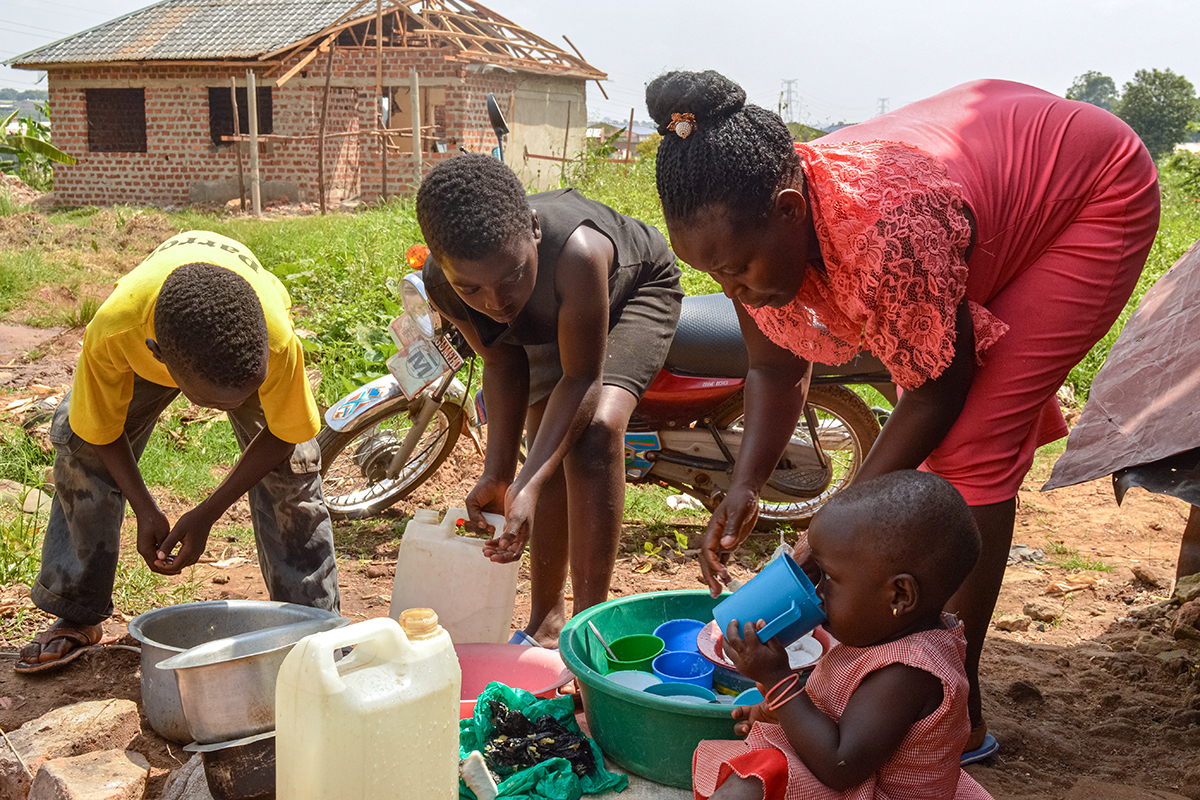
Nakisanze Segawa, GPJ Uganda
Prossy Nansubuga picks up bricks with her children on the site where her home once stood in the village of Lusanja, Uganda.
WAKISO, UGANDA — Prossy Nansubuga was 34 weeks pregnant when two men in military gear and three police officers came to her house and ordered her to evacuate.
The house was about to be demolished, they told her.
Nansubuga heard cries from her neighbors, then gunshots. Tear gas spread through the neighborhood and graders began to pull buildings down.
“I inhaled a strong stench of tear gas and fell down on the ground,” Nansubuga says. “I remember the baby coming out and I fainted at that moment.”
Nansubuga woke up in a hospital. Her infant son survived.



That was in September 2018. Forty houses were demolished in the village of Lusanja in Kampala, Uganda’s capital – leaving 350 people without a place to live. The demolitions occurred after a chief magistrate ordered the eviction of everyone living on the nine-acre parcel where those homes stood. The order came after Medard Kiconco, a local engineer, claimed ownership of the land.
On Dec. 14, 2018, a high court judge ruled that the evictions were illegal. That court ruled that Esther Nasambu, the magistrate judge who ordered the evictions, did not have jurisdiction in the case because she did not visit the area before she made her decision.
Even so, people who lived in the area say they haven’t received the money they were promised as compensation for their destroyed homes. Without it, people say they can’t replace what they lost.
The violent evictions on the nine-acre property in the village of Lusanja stem from a common problem in Uganda. A piece of land might be filled with homes, but can anyone prove who has the right to live there?
In the case of the 350 people who lived on the Lusanja land, it was Kiconco who asked for people be evicted. But the people who live there say they bought their plots from a woman named Crisper Bitarabeho, who sold the nine-acre piece of land in question to Kiconco in 2013. Kiconco says Crisper Bitarabeho had no right to sell any of the land because it belonged to her deceased father, Paul Bitarabeho, and that her brother, Paul Katabazai Bitarabeho, is the administrator of his family’s estate.
Global Press Journal, over the course of five days, called the only phone number that local people have for Crisper Bitarabeho, but those calls did not go through.
Kiconco says anyone who bought land there was duped, because he owns it and hasn’t sold any parcels.
Fred Kanyike, one of the residents who was evicted, says he bought his land from Crisper Bitarabeho in 2010. That didn’t protect him from what happened in September 2018. He says he remembers as many as 500 uniformed officers being there, and “tear gas everywhere.”
Vincent Makumbi, another person who lost his home, now sleeps in a tent provided by the government. He says he would need about 30 million Ugandan shillings (about $7,980) to reconstruct his house, but he hasn’t received a single shilling as compensation for the demolition. He says he bought his plot from Crisper Bitarabeho in 2011.



Nansubuga says she and her family bought their plot in Lusanja, but that the land was later sold, illegally, to Kiconco.
“If the judge had come on the ground, seen and talked to us and heard our opinion, I think the eviction would never have happened,” she says.
Nansubuga says her husband holds the documents proving land ownership, but he’s away, so she can’t prove ownership to anyone.
Dennis Obbo, spokesperson for the Ministry of Lands, Housing and Urban Development, says tenants or plot owners are protected under Uganda’s land tenure system.
“The landlord can’t sell off land without the consent of the tenants,” he says. “Conflicts arise when landlords make decisions on the land without [it].”
Land conflicts are especially frequent in Uganda’s Acholi sub-region. There, 98% of all cases reported before local council courts are related to land disputes, according to a 2017 report by the Uganda Human Rights Commission.
The same report shows that the disputes are orchestrated by family wrangles, land grabbing, forced evictions and unfair compensation by the government and investors.
Those problems are exacerbated by other issues, including corruption within the government and delays in the court system, along with Uganda’s growing population, says Ladislaus Rwakafuuzi, a Kampala-based lawyer.
Uganda has a fast-growing population, but land is limited, Rwakafuuzi says.
“In some cases individuals use excessive political power to gain land control over land which results into conflict,” he says.
Land conflict cases often take seven years or more to resolve, Rwakafuuzi says. Judges sometimes make rulings based on inaccurate information because they don’t always visit the land in question, he adds. Judges aren’t required by law to do so, but it’s considered best practice, he says.
Police investigations into land conflicts are often slow or inadequate, Rwakafuuzi adds, resulting in more delays.
In many cases, he says, people who legitimately own plots of land give up their land dispute court claim because extended delays might allow powerful landlords to forcibly begin using the land.
The Lusanja land conflict case is slowly moving through the court system as people who were evicted continually assert ownership and Kiconco responds in kind.
Kanyike, who still lives on the land, albeit without his house, says the process doesn’t offer any reassurance.
“We are not certain of staying here,” he says. “At any time, the court might decide that we have to leave this place.”
Nakisanze Segawa, GPJ, translated some interviews from Luganda.







